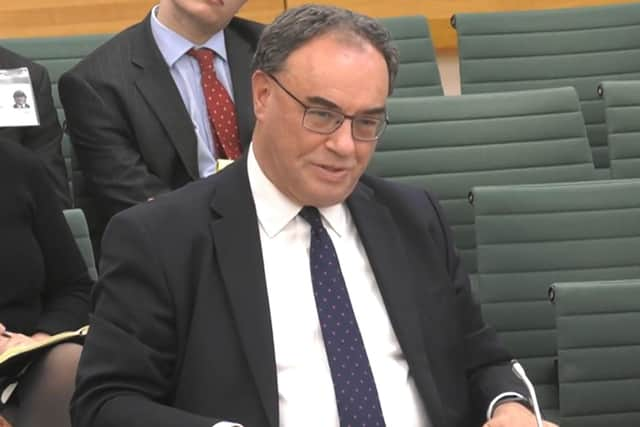Bank of England Governor claims mini-budget was 'not settled' day before it was announced
Andrew Bailey suggested Treasury officials had not been “clear” what was going to be in former chancellor Kwasi Kwarteng’s infamous statement that began the end of Liz Truss’s premiership.
Appearing in front of a House of Lords’ committee on Tuesday, Mr Bailey said a Treasury official was present at a meeting of the Bank's monetary policy committee the day before the ill-fated fiscal event that economists predict wiped £30 billion from the public purse.
Advertisement
Hide AdAdvertisement
Hide AdMr Bailey has stressed there was none of the typical levels of communication between the Treasury and the Bank of England ahead of September’s controversial mini-budget.


He told the economic affairs committee: “The lack of clarity between the prime minister and the chancellor about what was going to be in the statement, I think, illustrates the problem. It was just not known. It was not clear what was going to be in this statement.”
He said it was an “extraordinary” process and there was no formal communication of the sort that would normally be had before a fiscal statement.
Mr Bailey explained: “I didn’t say to the chancellor ‘you have to tell me what’s in this fiscal statement’, because, frankly, I would never say that to a chancellor.”
Lords also heard the absence of the usual official economic forecast ahead of September’s mini-budget made it difficult for the Bank to prepare.
Mr Bailey said: “By not involving the Office for Budget Responsibility (OBR) in the process, that took away a good deal of the substance that we rely upon go with a budget, from the point of view of forecasting and understanding the measures that were in it. That was just not there. There was nothing.”
He reiterated he, and the Bank of England, did not know what was going to be in the fiscal statement.
Mr Bailey said: “I did ask a number of people in the markets what surprised them given what they already knew. One was the absence of the OBR, even actually the positive ‘we don’t want the OBR involved’ message that came across.
“The second one was the abolishing of the top rate of taxation, which was something we had no idea was going to happen.”
Comments
Want to join the conversation? Please or to comment on this article.
